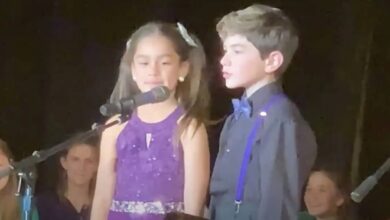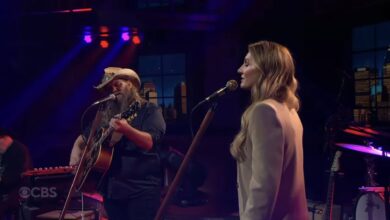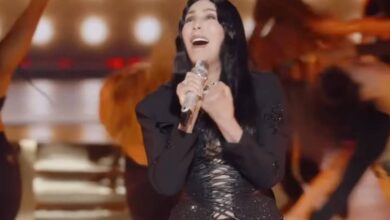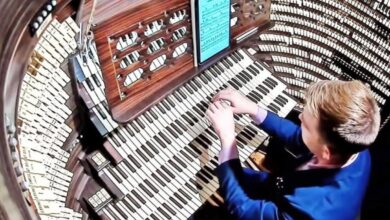Lesser-known goofs and slip-ups in the movie Pretty Woman.
“Pretty Woman” is a film I can watch repeatedly—it never loses its appeal.
Despite countless viewings, it’s surprising that I hadn’t noticed these bloopers and mistakes that offer a new perspective on the film.
Disney altered everything
“Pretty Woman” transformed into a romantic comedy that enchanted millions and propelled Richard Gere and Julia Roberts to superstardom.
However, that wasn’t the original plan. The initial screenplay was titled “3,000,” written by then-struggling screenwriter J.F. Lawton. This early draft delved into much darker themes of societal disparity and corporate greed.
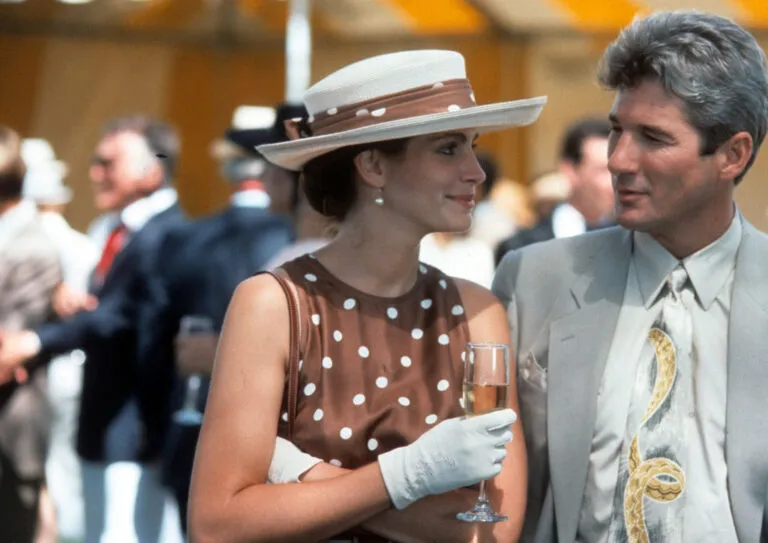
But everything changed when Disney took over. The company chose to minimize the themes of class and sex work in Los Angeles. Instead, Disney provided a substantial budget and turned it into a romantic comedy.
Al Pacino turned down the lead role
It’s hard to envision anyone other than Richard Gere playing Edward Lewis, the affluent businessman from New York who hires Vivian (Julia Roberts) to be his companion for a week.
The casting process for “Pretty Woman” took longer than expected, with Al Pacino initially in the running for the role of Lewis. The renowned actor even participated in a casting reading with Julia Roberts before ultimately deciding to decline the part.
Although he appreciated the script, Pacino never disclosed his reasons for passing on the role. In hindsight, he expressed admiration for Roberts, who was relatively unknown at the time.
“I mean, you could tell at the reading, this is going to be good, this is going to be a hit picture. You just knew it,” Pacino shared.
He continued: “And this girl was phenomenal. I mean, I said to Gary, ‘Where did you get this girl?'” (Gary being Garry Marshall, the film’s director). Pacino’s instincts were spot on, as Roberts’s standout performance would define her career and the film’s legacy.
The croissant becomes a pancake
In the scene where Richard Gere’s character orders breakfast to the room, there’s a funny detail you might have missed. It starts with Vivian enjoying a croissant while talking to Edward.
But then, suddenly, the croissant magically turns into a pancake.
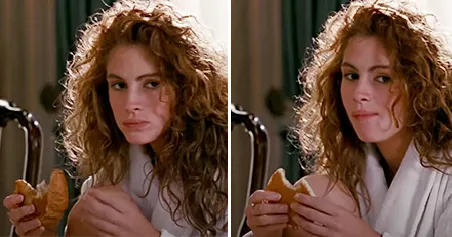
How did that happen? According to director Garry Marshall, he preferred Roberts’s performance in the later takes where she was eating a pancake instead of the croissant, so they kept that footage.
This choice, however, created a continuity issue. In the first shot with the pancake, Vivian takes a second bite, but in the following shot, the pancake has only one bite missing, and the bite pattern is noticeably different.
It’s clearly not the same pancake!
Truth behind the iconic dress
The careful consideration of costume design might go unnoticed by the average viewer. However, whether you’re fashion-savvy or not, it’s impossible to overlook the iconic red dress that Julia Roberts’s character wears in the movie.
The red dress symbolizes Vivian’s transformation and empowerment during a pivotal scene where she accompanies Edward to the opera.
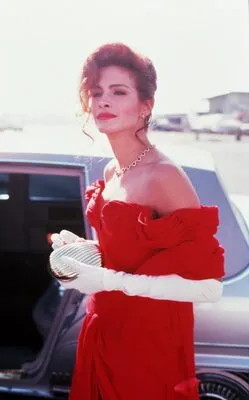
“Vogue” described the dress as “eye-catching, incredibly sexy without losing an ounce of elegance.” The genius behind that stunning dress? Award-winning costume designer Marilyn Vance.
She crafted six fabulous outfits for Julia Roberts’s character, Vivian Ward, and was also the mastermind behind Richard Gere’s dapper looks.
Take, for instance, the charming brown-and-white polka dot dress Roberts wore to the horse race. That little gem was created from old silk found in a tiny antique fabric shop in Los Angeles—talk about stylish recycling! And those chic shoes? They were by Chanel.
Richard Gere’s tie
As for Gere’s wardrobe, it was a masterclass in color coordination, featuring brown, navy, and blue-gray suits, all designed by Vance.
Now, about that famous tie that Roberts snatches from a store employee? According to Vance, it was “nothing special” and certainly not designer.
She picked it up in a Los Angeles shop for a cool $48.
The tie makes several appearances throughout the film, and if you watch closely, you might notice that it mysteriously changes knots from time to time.
During the polo match, Edward sports a straight-collar shirt along with the tie that Vivian gifted him, knotted in a half-Windsor. But in a later scene, observant viewers can spot a subtle change—Edward’s collar has magically transformed into a spread style, and the tie is now in a full-Windsor knot.
‘Obscene’ shopping spree
When Richard Gere introduces Julia Roberts’s character to the glamorous world of the rich, he takes her on an extravagant shopping spree down Rodeo Drive in Beverly Hills.
That afternoon shopping trip would have set Edward back at least $30,000, according to designer Marilyn Vance.
Talk about a retail therapy session on steroids! It’s like they were shopping with Monopoly money—no wonder Vivian was overwhelmed.

The ruby-and-diamond necklace was real
The jewelry Julia Roberts wore with her stunning red ball gown—a heart-shaped necklace crafted from rubies and diamonds—was valued at a whopping quarter million dollars. Yes, you read that right.
According to movie trivia sites, this ruby-and-diamond masterpiece was authentic. In fact, while filming, an armed security guard hired by the jewelry store responsible for this extravagant necklace stood vigilantly behind the director.
Jewelry box scene was a practical joke
The scene where Richard Gere presents Julia Roberts with the pricey necklace is not only one of the most romantic and iconic moments in movie history but also has a funny backstory.
Originally, it was meant as a playful prank for the film’s gag reel.
As you might recall, the jewelry box snaps shut on Julia Roberts’s fingers, prompting one of the most genuine, charming laughs ever captured on film.
The real story behind the scene came from director Garry Marshall, who revealed why he and Gere decided to play the trick on the young actress.
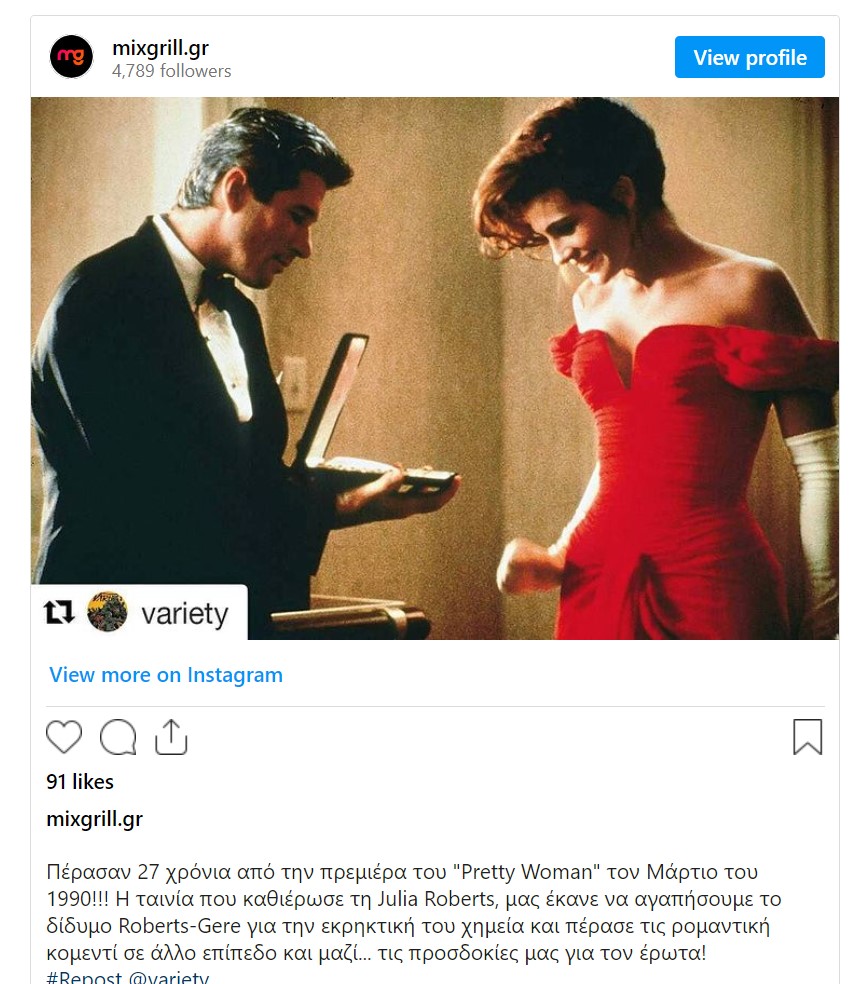
According to Marshall, Roberts, then just 23, would sometimes arrive on set a bit sleepy after a late night out.
“I said, ‘Richard, you gotta wake her up a little, so when she reaches for the box, slam it.’ It was a soft box. I would never hurt her,” Marshall explained.
It wasn’t until the final stages of editing that they chose to keep the scene in the movie. “We put it in… and it became like the trademark of the movie,” Marshall said.
And just like that, an unscripted joke turned into cinematic magic.
Edward’s disappearing shoes
As mentioned earlier, there are some mistakes in “Pretty Woman” that aren’t easy to catch on the first viewing, but some eagle-eyed viewers have spotted them all the same.
For example, when they leave the opera and head to the park, Vivian takes off Edward’s shoes. However, as he begins to lie down, the shoes magically reappear.
Money in the boot
Speaking of things on (or in) your feet, there’s a little mystery involving Vivian’s boots that you might have missed.
When Edward hands her $100 in the penthouse, she slips the cash right into her boot for safekeeping. But later, after the room service arrives with champagne and she takes off her boots, the money has mysteriously disappeared.
Did the cash vanish into thin air, or is Vivian just really good at hiding things? Maybe those boots came with a secret compartment, or perhaps the $100 decided it didn’t want to stick around for the rest of the film…
When Vivian offers Edward a selection of colorful condoms, it seems they have a mind of their own.
Four colored condoms
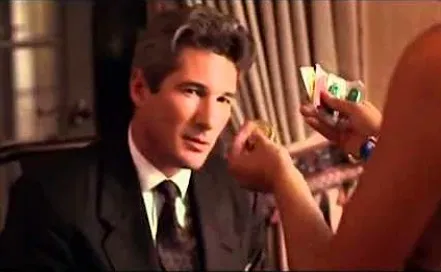
Vivian starts with four neatly arranged options (not counting that fancy gold circle one). But in the next shot, like magic, the order has completely changed.
Richard Gere didn’t like his character
Richard Gere has certainly benefited from the success of “Pretty Woman”—both in terms of his career and finances. But he hasn’t always been entirely positive about the film, especially regarding his character, Edward. At a film festival in Venice, Gere described Edward as “criminally underwritten.” He added, “Basically, he’s just a suit and a good haircut.”
One scene in particular seemed to irk Gere, featuring Edward playing the piano while Vivian edges closer. Reflecting on it, Gere sarcastically remarked: “I mean, no chemistry. This actor and this actress obviously had no chemistry between them… I haven’t seen that in a long time. That’s a sexy scene.”

Director Garry Marshall came up with the idea for the scene after asking Gere what he usually did late at night in a hotel. Gere recalled, “And I said, ‘Well, I’m usually jet lagged, [that] would be the time I’m in a hotel. So I’m up all night and usually there’s a ballroom somewhere or a bar, and I’ll find a piano and I’ll play the piano.'” Marshall then suggested, “Well, let’s do something with that.”
So, the scene was essentially improvised, with Gere explaining: “He said, ‘Play something moody.’ I just started playing something moody that was this character’s interior life.”
Then, just as mysteriously, they snap back to the original lineup in the third shot. It’s as if the condoms were having their own little dance routine behind the scenes.
More than just onscreen lovers
In my opinion, the chemistry between Julia Roberts and Richard Gere in “Pretty Woman” was undeniable. But the sparks didn’t just fly when the cameras were rolling—they formed a close bond off-screen too.
In 2017, Gere shared that he still talks to Roberts “all the time,” and back in the day, they would speak “three or four times a day.”
You could say it was love at first sight, in a friendly sort of way.
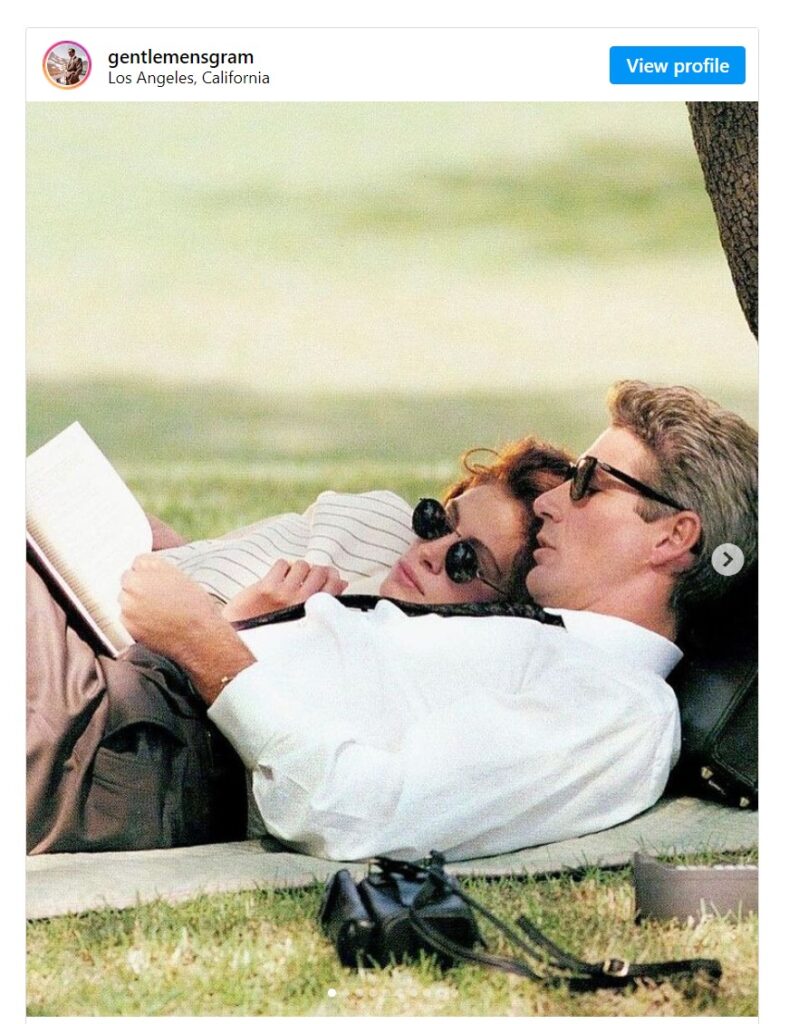
“Yeah, we loved each other immediately. So it was a nice thing,” Gere admitted.
Even director Garry Marshall noticed the connection between them right away.
He recalled a moment during the first meeting when he stepped out to use the restroom, leaving the actors alone to get acquainted.
“I came out and saw the two of them at the end of a hall, just looking at each other,” Marshall said. “And right there, I thought, look at that chemistry. They don’t know each other, and yet they’re doing great.”
Roberts convinced Gere to star in “Pretty Woman”
Although Al Pacino came close to landing the role, it seems Julia Roberts was determined to have Richard Gere as her on-screen partner.
She practically pleaded with Gere in a very genuine way.
“He’s a very serious actor and he had very specific thoughts about the movie and the part and what worked and didn’t work for him,” she told SiriusXM in 2017.
“I think I just nodded and smiled a lot and agreed with everything he said. I said, ‘You have to do this movie, if you don’t do this movie and it falls apart and I lose this job it’ll just be terrible.'”
And this is how it all went down according to Richard Gere:
“I still didn’t know if I was doing this movie. We’re getting to know each other, we’re flirty, flirty… nice, nice… She takes a piece of paper, writes something on it, turns it around, and pushes it to me… ‘Please say yes.'”
Even in a fairytale romance, things don’t always go as planned. Maybe that’s what makes this movie so endearing—and keeps us coming back for another look, year after year.
Did we miss your favorite “Pretty Woman” blooper? Share it with us and keep the fun going!

